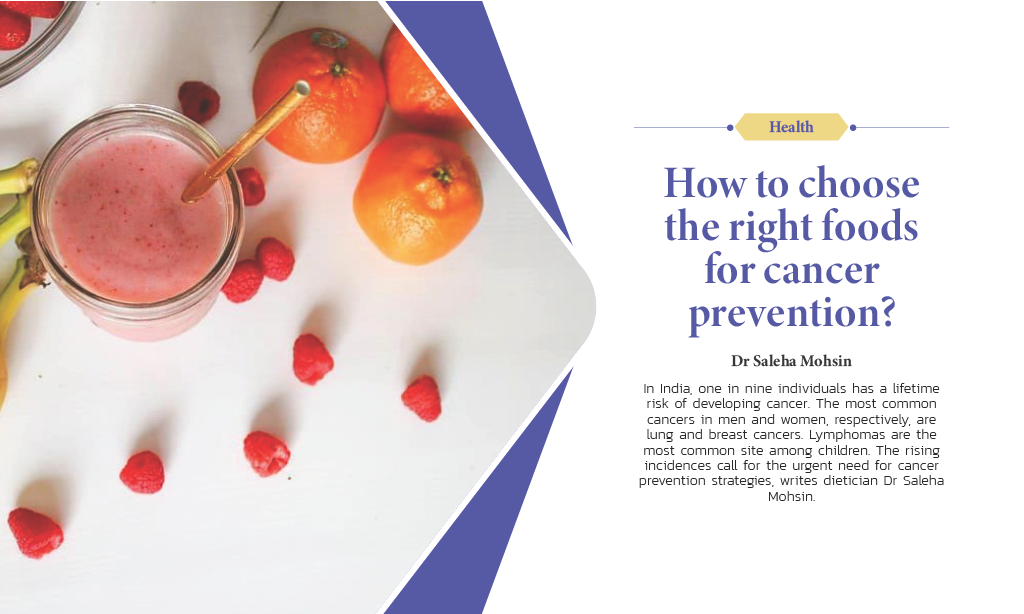“In India, one in nine individuals has a lifetime risk of developing cancer. The most common cancers in men and women, respectively, are lung and breast cancers. Lymphomas are the most common site among children. The rising incidences call for the urgent need for cancer prevention strategies, writes dietician Dr Saleha Mohsin.”
The topic of cancer prevention has been widely researched and discussed. One of the key areas of focus in this regard is diet. The foods we consume can have a significant impact on our health, including our risk of developing cancer.
Understanding the link between diet & cancer:
-
- Research studies have confirmed that certain dietary habits are linked with an increase or decrease in the risk of cancer.
Many foods are rich in cancer-fighting phytochemicals and their regular consumption may decrease the risk of cancer. Some of them are:
Alpha Lipoic Acid (ALA): ALA is found in foods like potatoes and carrots, and is used in cancer prevention. - Flavonoid: This is a colour pigment found in garlic, carrots, brinjal, grapefruit, oranges, red cabbage, tea, and tomatoes. It is protective against cancer.
- Glutathione: This is an antioxidant found in asparagus and avocado. Its low levels are associated with cancer.
- Vitamin C: It is found that vitamin C destroys cancer-causing agents. Rich sources of vitamin C include amla, papaya, orange, lemon, capsicum, sprouts, and broccoli.
- Vitamin E is cancer preventive. Almonds, soybeans, spinach, sunflower seeds, sweet potato, walnuts, and whole wheat flour are rich in vitamin E.
- Omega-3 fatty acids found in fish, soyabean oil, and walnuts are found to be effective in cancer prevention.
- Dietary fibre: Dietary fibres are protective against colon cancer. They bind with potential carcinogens and promote their excretion. They influence the intestinal flora and protect the lining of the intestines. Whole grains like whole wheat, brown rice, whole pulses, raw fruits, and vegetables are the best sources of dietary fibre.
- Antioxidants: Antioxidants are naturally occurring nutrients which help to protect from cancers. Antioxidants decrease the severity of cancer. They are known to stabilize the free radicals. Free radicals are unstable damaged molecules formed in our body. They damage the body cells if not stabilised. Lycopene found in fruits and vegetables, especially tomatoes, vitamin A, vitamin C and vitamin E are well-proven antioxidants in treating gastrointestinal, cervical and breast cancers.
- Research studies have confirmed that certain dietary habits are linked with an increase or decrease in the risk of cancer.
Dietary carcinogens:
Some ingredients in the food can cause cancer. These are called dietary carcinogens.
-
- Heavily smoked, pickled, and salted food is associated with stomach cancer.
- Alcohol has been associated with high chances of mouth and throat cancer.
- Beer, wine, and brandy have also been associated with cancer due to the presence of carcinogen urethane and nitrosamine.
- Endometrial and gallbladder cancer have been linked with increased intake of calories.
- Colon and breast cancer are linked to high protein and fat consumption.
- Trans-fats (formed by reheating of oils) are potential carcinogens.
Foods that fight cancer:
No single food can fight cancer. Including a variety of foods having anti-cancer properties in diet may reduce the risk of developing cancer.
-
- Fruits especially berries, orange, grapefruit, avocado, apple, grapes.
- Vegetables particularly tomatoes, carrots, broccoli, cauliflower, potatoes, spinach, garlic, brinjal, red cabbage, onions, asparagus, brussel sprouts, sweet potato.
- Fish, fish oils, seafood
- Dairy products, eggs
- Walnuts, almonds
- Whole grains, whole wheat, brown rice
- Soybean, pulses, legumes
- Sunflower seeds, flax seeds,
- Tea, coffee
American cancer society guidelines for cancer prevention (2020):
English Normal Text
-
- Achieve and maintain ideal body weight throughout the lifetime.
- Be physically active.
- Limit sedentary behaviours like sitting and watching television.
- Follow a healthy eating pattern.
- Include:
- Foods that are high in nutrients in amounts that help achieve and maintain a healthy body weight.
- A variety of vegetables—dark green, red, and orange, fibre-rich legumes (beans and peas) and others.
- Fruits, especially whole fruits with a variety of colours; and
- Whole grains.
- Limit or remove:
- Red and processed meats
- Sugar-sweetened beverages,
- Highly processed foods and refined grain products.
- Avoid or limit alcohol.
While there’s no surefire way to prevent cancer, making healthy dietary choices can significantly reduce your risk. By following the dietary guidelines for cancer prevention, you can not only lower your risk of cancer but also improve your overall health. Remember, it’s not about making drastic changes overnight, but rather about making small, sustainable changes to your diet over time.
Remember to consult with a healthcare professional before making any major changes to your diet or lifestyle. Get personalized advice based on your individual health needs and risks.
Dr. Saleha Mohsin
currently residing in Kuwait.
Registered homeopathic doctor (Bachelor in homeopathic medicine and surgery from Delhi university), consultant dietician (MSc Dietetics and food service management) and certified in nutrition and childcare.


0 Comments